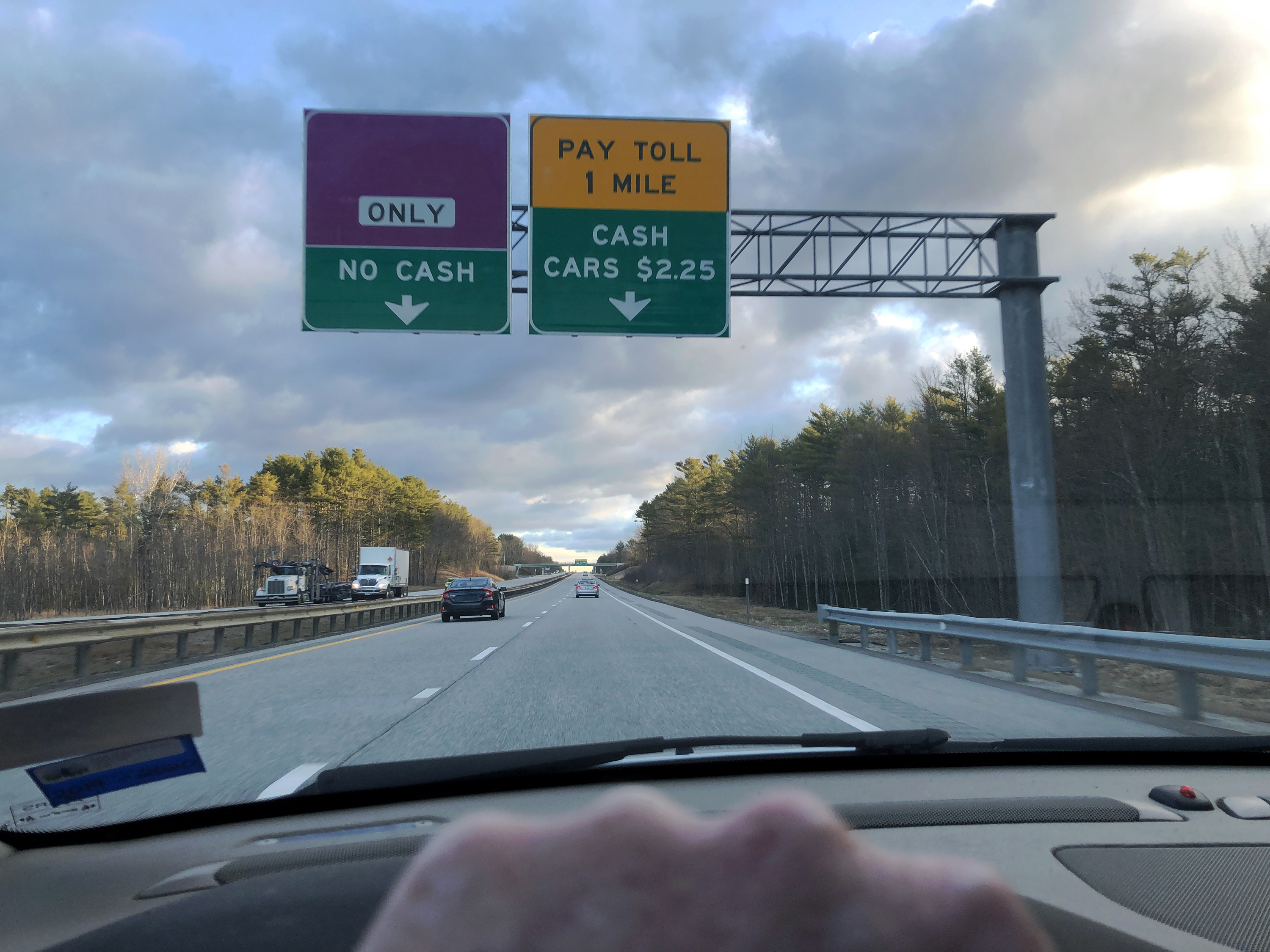Road Toll Scam Texts are Still Going Around. Here's What to Look Out For
Warnings have been going around for a year about a text scam using language about E-ZPass.


Profit and prosper with the best of Kiplinger's advice on investing, taxes, retirement, personal finance and much more. Delivered daily. Enter your email in the box and click Sign Me Up.
You are now subscribed
Your newsletter sign-up was successful
Want to add more newsletters?

Delivered daily
Kiplinger Today
Profit and prosper with the best of Kiplinger's advice on investing, taxes, retirement, personal finance and much more delivered daily. Smart money moves start here.

Sent five days a week
Kiplinger A Step Ahead
Get practical help to make better financial decisions in your everyday life, from spending to savings on top deals.

Delivered daily
Kiplinger Closing Bell
Get today's biggest financial and investing headlines delivered to your inbox every day the U.S. stock market is open.

Sent twice a week
Kiplinger Adviser Intel
Financial pros across the country share best practices and fresh tactics to preserve and grow your wealth.

Delivered weekly
Kiplinger Tax Tips
Trim your federal and state tax bills with practical tax-planning and tax-cutting strategies.

Sent twice a week
Kiplinger Retirement Tips
Your twice-a-week guide to planning and enjoying a financially secure and richly rewarding retirement

Sent bimonthly.
Kiplinger Adviser Angle
Insights for advisers, wealth managers and other financial professionals.

Sent twice a week
Kiplinger Investing Weekly
Your twice-a-week roundup of promising stocks, funds, companies and industries you should consider, ones you should avoid, and why.

Sent weekly for six weeks
Kiplinger Invest for Retirement
Your step-by-step six-part series on how to invest for retirement, from devising a successful strategy to exactly which investments to choose.
A text-based scam claiming to be about driving tolls has been going from state to state and shows no sign of slowing. For over a year, people have been receiving texts claiming they have an outstanding balance for road tolls, often a small amount.
The texts look like they come from E-ZPass and include a link to pay the outstanding balance. If you click on the link, you can quickly become victim to a scam and potentially face hefty losses, including monetary and related to identity theft.
In fact, the FBI has been warning about this scam since last spring. The warning says this is a "smishing" scam, a term that combines "SMS" (another term for text messages) and "phishing" — when scammers use fake messages to trick people.
From just $107.88 $24.99 for Kiplinger Personal Finance
Become a smarter, better informed investor. Subscribe from just $107.88 $24.99, plus get up to 4 Special Issues

Sign up for Kiplinger’s Free Newsletters
Profit and prosper with the best of expert advice on investing, taxes, retirement, personal finance and more - straight to your e-mail.
Profit and prosper with the best of expert advice - straight to your e-mail.
What does the road toll scam text look like?
These phishing texts look like any other text you might get. They're from a phone number likely not saved as a contact in your phone, and the number is not always the same from person to person.
According to the FBI alert, the text says something like: "(State Toll Service Name): We've noticed an outstanding toll amount of $12.51 on your record. To avoid a late fee of $50.00, visit https://myturnpiketollservices.com to settle your balance."
The link is made to look like it comes from your state's toll service name.
What should you do if you think you got an E-ZPass scam text?
If you received a text that seems to be a scam, the FBI suggests you file a complaint with the Internet Crime Complaint Center (IC3) including the phone number you received the text from and the website URL used in the text.
The FBI further suggests you do the following:
- If you have an account with a road toll company, check your account — going directly to their website.
- Call that toll service's customer service phone number.
- Delete the texts.
If you clicked on the link, the FBI recommends securing personal information and financial accounts and disputing any unfamiliar charges.
At this point, warnings have come out about these texts from all over the country. You should check with your state's service center for any suggestions specific to them. For example, the Virginia E-ZPass recommends forwarding the text to a federal spam service, while the New York State Thruway Authority suggests you can call customer service with any questions.
What can scammers get in the road toll phishing attack, and how can you counter it?
The easiest way to stop a scammer is to not click on any link from any unfamiliar phone number or email address. If you click on a smishing link and provide your personal information, scammers now have access to a host of options.
They can, for example, use the information provided to try to hack into your bank account with a username and password. They can also use your information to, say, apply for a credit card in your name, and then use that credit card as they see fit.
Scammers can also use your information to target other people in your life. For example, they can impersonate you in texts and emails to your family members, implicating them in new scams where they hand over money thinking it's for you.
Still, there are some basic safety measures you can take.
For example, you should immediately change the passwords on sensitive accounts like for your bank or brokerage. When you change a password, make sure it follows smart methods (rather than, say, a password someone with your basic information could easily guess) and use a different password for each account. A password manager like NordPass or 1Password can help both safely store your passwords and set passwords that are hard to hack.
Another safety measure is to freeze your credit, something Kiplinger has recommended many times before. That means that if someone tries to open a credit card in your name, for example, they'll meet a barrier. You can leave a freeze up permanently and only unfreeze it when you're applying for credit, and that will keep you safer from unexpected attacks.
In order to freeze your credit, you need to go through Equifax, Experian and TransUnion.
The advice for avoiding scams remains the same: If you get an unusual call, text or email, stop, breathe and think about it. Don't click links or hand over personal information. If a text claims to be from a specific service or person, pick up the phone and call that company's customer service line or that person's number to see if it's really them before you hand over any information that could end up damaging you.
Related Content
Profit and prosper with the best of Kiplinger's advice on investing, taxes, retirement, personal finance and much more. Delivered daily. Enter your email in the box and click Sign Me Up.

Alexandra Svokos is the digital managing editor of Kiplinger. She holds an MBA from NYU Stern in finance and management and a BA in economics and creative writing from Columbia University. Alexandra has over a decade of experience in journalism and previously served as the senior editor of digital for ABC News, where she directed daily news coverage across topics through major events of the early 2020s for the network's website, including stock market trends, the remote and return-to-work revolutions, and the national economy. Before that, she pioneered politics and election coverage for Elite Daily and went on to serve as the senior news editor for that group.
Alexandra was recognized with an "Up & Comer" award at the 2018 Folio: Top Women in Media awards, and she was asked twice by the Nieman Journalism Lab to contribute to their annual journalism predictions feature. She has also been asked to speak on panels and give presentations on the future of media and on business and media, including by the Center for Communication and Twipe.
-
 5 Vince Lombardi Quotes Retirees Should Live By
5 Vince Lombardi Quotes Retirees Should Live ByThe iconic football coach's philosophy can help retirees win at the game of life.
-
 The $200,000 Olympic 'Pension' is a Retirement Game-Changer for Team USA
The $200,000 Olympic 'Pension' is a Retirement Game-Changer for Team USAThe donation by financier Ross Stevens is meant to be a "retirement program" for Team USA Olympic and Paralympic athletes.
-
 10 Cheapest Places to Live in Colorado
10 Cheapest Places to Live in ColoradoProperty Tax Looking for a cozy cabin near the slopes? These Colorado counties combine reasonable house prices with the state's lowest property tax bills.
-
 Look Out for These Gold Bar Scams as Prices Surge
Look Out for These Gold Bar Scams as Prices SurgeFraudsters impersonating government agents are convincing victims to convert savings into gold — and handing it over in courier scams costing Americans millions.
-
 My First $1 Million: Retired Nuclear Power Plant Supervisor, 68, Wisconsin
My First $1 Million: Retired Nuclear Power Plant Supervisor, 68, WisconsinEver wonder how someone who's made a million dollars or more did it? Kiplinger's My First $1 Million series uncovers the answers.
-
 No-Fault Car Insurance States and What Drivers Need to Know
No-Fault Car Insurance States and What Drivers Need to KnowA breakdown of the confusing rules around no-fault car insurance in every state where it exists.
-
 7 Frugal Habits to Keep Even When You're Rich
7 Frugal Habits to Keep Even When You're RichSome frugal habits are worth it, no matter what tax bracket you're in.
-
 How Much It Costs to Host a Super Bowl Party in 2026
How Much It Costs to Host a Super Bowl Party in 2026Hosting a Super Bowl party in 2026 could cost you. Here's a breakdown of food, drink and entertainment costs — plus ways to save.
-
 3 Reasons to Use a 5-Year CD As You Approach Retirement
3 Reasons to Use a 5-Year CD As You Approach RetirementA five-year CD can help you reach other milestones as you approach retirement.
-
 How to Watch the 2026 Winter Olympics Without Overpaying
How to Watch the 2026 Winter Olympics Without OverpayingHere’s how to stream the 2026 Winter Olympics live, including low-cost viewing options, Peacock access and ways to catch your favorite athletes and events from anywhere.
-
 Here’s How to Stream the Super Bowl for Less
Here’s How to Stream the Super Bowl for LessWe'll show you the least expensive ways to stream football's biggest event.